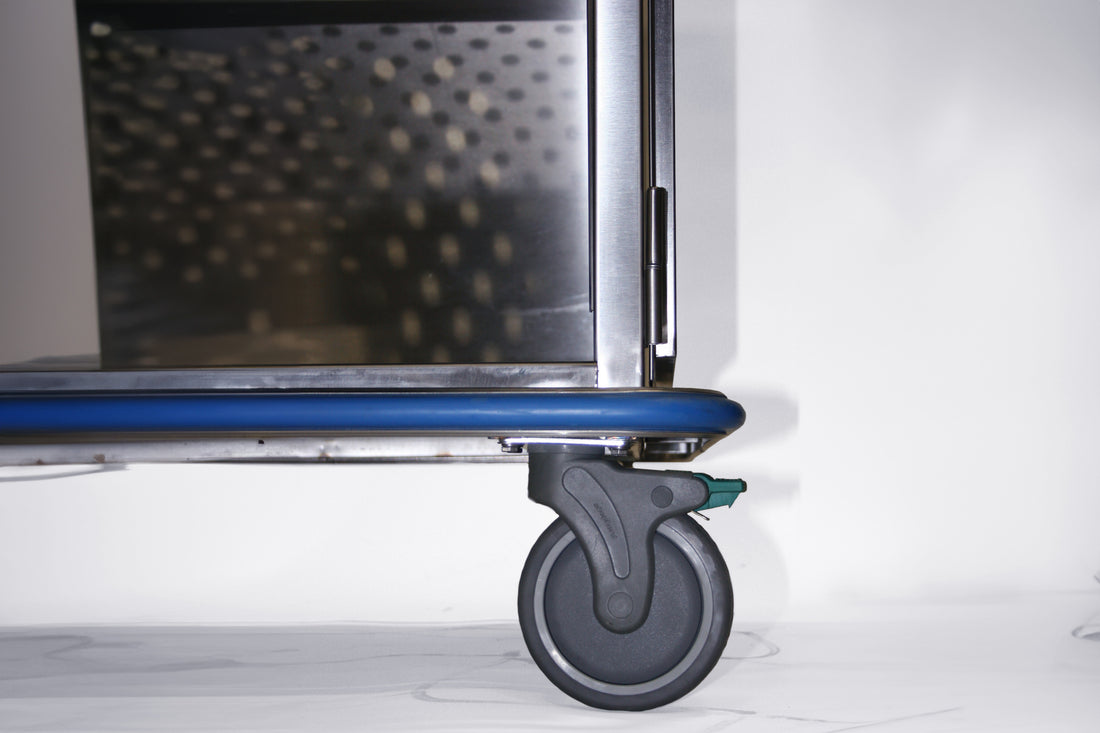In a post-covid era, we have become much more aware of proper asepsis processes. Better and stronger chemicals are used, and Case Carts are put through high-heat washer/disinfectors to improve the storage and transport of sterile instruments and supplies. Case Carts are widely used in hospitals and surgical facilities throughout the world and just like any other equipment in a healthcare setting, case carts undergo frequent and harsh sanitation to prevent the spread of infections.
However, many of us may overlook the casters on the Case Carts. Without proper maintenance or backup, the casters will fail, seize up or break down, risking the sanitation of the contents and safety of the staff transporting it through the hospital.
How To Ensure Your Casters are Safe
Here are 4 important steps to ensure that your case cart casters are operating safely and efficiently.
1. Choosing the right casters
Choose the right casters when you buy your cart. Although the casters can look similar when comparing brand new case carts, it is important to make sure that the caster will meet the specifications of your cleaning methods. Look for casters made of durable, non-corrosive materials, (such as stainless steel) that can withstand frequent high temp/high-pressure washing and have sealed bearings. If you are considering a Case Cart that is significantly lower cost than the industry standard, take a close look at the casters as this is an easy component to cut corners and produce lower cost carts.
2. Regular Inspections
Clean and inspect regularly. Before and after each use, inspect the case cart and its casters for any signs of damage, wear, or buildup of dirt and debris. Your carts will likely go through a cart washer meaning that you will not have to worry about sanitizing however, you will need to manually remove the buildup of floor debris as this will affect the function of the caster and is not necessarily cleaned out with in the automated processes.
3. Lubrication and Minor Adjustments
Lubricate and adjust as needed. If you notice that the casters are not rolling smoothly or making unusual noises, it may be time to adjust the brakes or locks. Case Cart casters have sealed bearings making lubrication impossible meaning any lubrication will wash off during the cart washing process. Never attempt to fix or replace the casters yourself unless you are trained to do so.
4. Stock Spares in case of Failure
Keep spares on hand. Even with regular maintenance and care, casters will wear out eventually. That is why it is essential to keep spare casters in stock so you can quickly replace them and avoid downtime. Consider keeping a set of casters for each size or type of case cart you use, as well as extra hardware and tools needed for installation.
Conclusion
Maintaining case cart casters is critical for ensuring efficiency and safety in healthcare settings. By following these simple tips, we can help extend the casters lifespan and minimize the risk of contamination, injuries, or equipment failure. Let us not forget about this often-overlooked component and give our case carts the attention they deserve!

